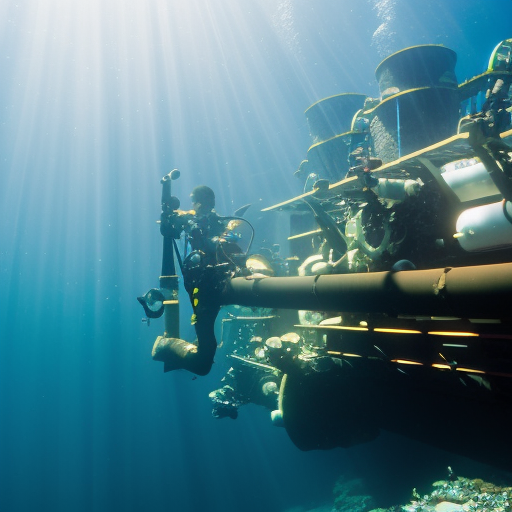Summary:
Deep-sea exploration involves the study and exploration of the ocean depths, which are characterized by extreme conditions and unknown ecosystems. This field of research has made significant advancements in recent years, thanks to technological advancements and improved understanding of the deep-sea environment. Deep-sea exploration has provided valuable insights into the geological, biological, and ecological aspects of the deep ocean, as well as potential resources and the impacts of human activities.
The Challenges of Deep-Sea Exploration:
Exploring the deep sea is challenging due to the extreme conditions that exist at great depths. The pressure increases dramatically, and temperatures drop significantly. Additionally, the lack of sunlight makes it difficult for photosynthesis to occur, leading to a scarcity of food and energy sources. These conditions require specialized equipment and vehicles to withstand the pressure and navigate the deep-sea environment.
Technological Advancements:
Technological advancements have played a crucial role in deep-sea exploration. Remotely Operated Vehicles (ROVs) and Autonomous Underwater Vehicles (AUVs) are used to explore the depths and collect samples. These vehicles are equipped with cameras, sensors, and manipulator arms to capture images, measure environmental parameters, and collect samples. They are remotely controlled from the surface and can withstand the extreme conditions of the deep sea.
Discoveries and Insights:
Deep-sea exploration has led to numerous discoveries and insights into the deep ocean. Scientists have discovered new species, including deep-sea corals, fish, and other organisms adapted to the extreme conditions. They have also found hydrothermal vents, which are cracks in the seafloor that release hot, mineral-rich fluids and support unique ecosystems. These discoveries have expanded our understanding of the diversity and adaptability of life on Earth.
Geological and Ecological Implications:
Deep-sea exploration has provided valuable insights into the geological processes that shape the ocean floor. Scientists have studied underwater volcanoes, seamounts, and trenches, gaining a better understanding of plate tectonics and the formation of mineral deposits. This knowledge has implications for resource exploration and extraction.
The ecological implications of deep-sea exploration are also significant. The deep sea is home to fragile and unique ecosystems that are vulnerable to human activities. Deep-sea trawling, mining, and pollution can have devastating effects on these ecosystems, which often have slow recovery rates due to the harsh conditions. Understanding the ecological importance of the deep sea is crucial for conservation efforts and sustainable resource management.
Potential Resources:
Deep-sea exploration has identified potential resources in the form of mineral deposits, including polymetallic nodules, hydrothermal vents, and methane hydrates. These resources have attracted interest from industries and governments for their economic potential. However, their extraction poses significant environmental challenges and requires careful consideration of the potential impacts on deep-sea ecosystems.
Future Directions:
Deep-sea exploration is an ongoing field of research with many unanswered questions. Scientists are continually developing new technologies and methods to explore the depths more effectively. Future research will focus on understanding the impacts of climate change on deep-sea ecosystems, further exploration of unexplored regions, and the development of sustainable practices for resource extraction.
In conclusion, deep-sea exploration is a challenging but rewarding field of research. Technological advancements have enabled scientists to explore the depths and make significant discoveries. This research has provided valuable insights into the geological, biological, and ecological aspects of the deep sea. However, it is essential to balance exploration with conservation efforts to ensure the long-term sustainability of these unique and fragile ecosystems.












